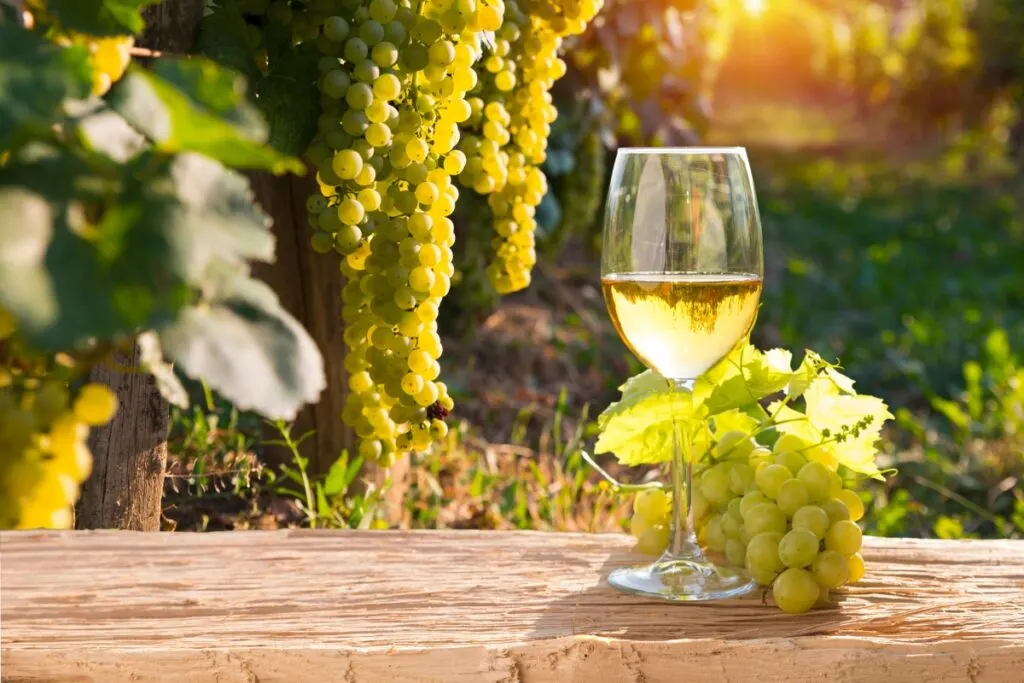As an Amazon Associate, I earn from qualifying purchases with no additional costs for you.
I spent summer vacations on the family wine farm when I was young. I remember a day when my older cousin and I walked in the vineyards, picking and eating grapes. I may have eaten too many grapes and got a stomach ache. My cousin laughed and said that it was the alcohol in the grapes making me feel sick. Thinking back, I decided to find out if wine grapes contain alcohol.
Grapes do not contain alcohol; they contain sugar which is 1 of the two components needed to make alcohol. The other component is yeast. Wild yeast accumulates on the outside of grape skins, and the two components mix when the grapes are pressed into juice and fermentation starts.
Read on to learn why some people believe that wine grapes contain alcohol and if there are any conditions where your grapes can contain trace amounts of alcohol.

TIP: If you want to check out the best refrigerator for wine storage, I recommend trying out the Avation (18 bottles) compressor refrigerator with Wi-fi smart app control cooling system. You can find this refrigerator by clicking here (Amazon link).
Recommendation box: Everything you need to enjoy your wine as much as possible. All recommended products are personally tested and regularly used by experts from this website (Amazon links):
> Ivation Wine Cooler – Energy-efficient wine cooler for 18 bottles with Wi-fi smart app control cooling system.
> Wine Rack – Beautiful, elegant wood rack for up to 7 bottles and the choice of vertical or horizontal storage.
> Durand Wine Opener – Classic vintage wine opener (we like all these classic staff).
> YouYah Iceberg Wine Decanter – The most beautiful and handy wine decanter we personally use.
> Bormioli Rocco Wine Glasses – A set of eight elegant and traditional wine glasses made in Italy.
> Vintorio Wine Aerator – Simple but really useful wine aerator for a reasonable price.
> The Original Vacu Vin Wine Saver – The best wine saver on the market in a package with two vacuum stoppers and two wine servers.
And if you want to become a true connoisseur of wine, we recommend reading the book Wine Folly: The Essential Guide to Wine (Amazon link), where you will find all the information you need about winemaking, wine varieties, flavors, and much more.
Do Wine Grapes Contain Alcohol
Technically speaking, wine grapes do not contain any alcohol. However, because wine grapes contain sugar and wild yeast collects on their skins when wine grapes are picked, it is a distinct possibility that the yeast from the wineskins can come into contact with the sugar within the grapes, and some degree of fermentation can begin to take place.
Therefore once you have picked grapes and if you leave them out at room temperature for a couple of hours, there is a possibility that any of the grapes that have broken skins may now contain some small amount of alcohol.
According to the CDC, foods and drinks need less than 0.5% alcohol per volume to be classified as alcohol-free and safe for pregnant women.
A study measuring the alcohol content of foods marked as safe for children showed that wine grapes left to sit at room temperature for a couple of hours would not have a high enough amount of alcohol in them to be officially classified as an alcoholic foodstuff.
What the study did show was that raw/organic grape juice could have as much as 0.77% alcohol per volume which is above the CDC guideline.
Grapes on their own don’t contain because there’s not yet been sufficient fermentation for a significant amount of sugar to be converted to alcohol. If you had to press your wine grapes into raw juice and leave the juice out overnight on the skins, fermentation would have started by morning.
Do Grapes Naturally Have Alcohol
Grapes do not naturally have alcohol. For alcohol to be produced, you need both sugars and yeast to consume the sugar and produce alcohol as a by-product.
Grapes do naturally contain enough sugar to be able to produce alcohol, and by a miracle of nature, grape skins tend to accumulate during yeast.
It is only during the process of pressing grapes that the yeast comes into contact with the juice, and fermentation can begin, producing alcohol. Grape skins keep the yeast and sugars separate, keeping the grapes alcohol-free until they are pressed.
TIP: If you are interested in buying a wine decanter, I recommend purchasing these two top-quality decanters:
- USBOQO Wine Decanter (check it out on Amazon & read customer reviews)
- Iceberg Wine Decanter (check it out on Amazon & read customer reviews)
What Alcohol Is in Grapes?
The type of alcohol that grapes can produce is ethanol. However, you do not find ethanol in any significant amounts in grapes.
For ethanol to be produced, you need a combination of sugar and yeast, and when it comes to grapes, the sugar is inside the grape, and the yeast is on the outside of the grape skin.
For any fermentation, the grape skin must be broken for the yeast outside of the skin to come into contact with the sugars inside the grape.
So if you want your grapes to contain ethanol, you need to have pressed the grapes even slightly to make sure that the skins are broken.
Once the grape skins have broken, the yeast on the outside of the grape can come into contact with the sugar on the inside. That is the only way for grapes to have any ethanol before you start to make wine.
TIP: In the world of fine wines, France and California have emerged as powerhouses in the wine industry. Find out the differences between these famous wines in this article. But if you prefer California wines, this article explains why these wines are so good and unique.
Why Are Grapes Alcoholic?

The reason why grapes are considered to be alcoholic is a simple one. Grapes contain a high enough amount of sugar to make the fermentation process easier.
Some other fruits, such as dates and figs, have a high enough volume of sugar that could make for fermentation. The problem with dates and figs is that the fruit does not contain enough water to produce a fermented drink.
This is why grapes are the perfect fruit for making wine, as they have a high sugar and water content. Additionally, nature has given grapes the kind of skin that can accumulate the wild yeast needed for converting the sugars into alcohol.
TIP: Most wines go bad once you pop the cork within a day or so. But a Coravin Wine Preservation system (available for a great price on Amazon) can extend the life of your opened wine for weeks or even months. It is awesome. You should check it out to see if it fits your lifestyle.
This is why winemakers leave their pressed grape juice on the skins for a few hours, letting the yeast contact the sugary juice.
This fermentation process continues until the yeast has managed to convert all of the sugars in the juice into alcohol, leaving you with a beverage that has an alcohol content of between 11 and 15%.
However, in warm climates where the grapes have an even high sugar content, that alcohol percentage could be as high as 17% in naturally fermented wine.
The alcohol in the wine is at a high enough percentage to act as a preservative and allow the wine to be safely stored without any decay/rotting.
TIP: To learn if a wine refrigerator is needed for ideal storage, you should check out this helpful article. And if you want to know if cheap wine can be stored and aged, check out this excellent article.
Is Unfermented Wine Alcoholic?
Unfermented wine is not alcoholic. The reason is simple for alcohol to be produced, there needs to be fermentation. Therefore unfermented wine is effectively just grape juice.
This does not mean that you can’t get alcohol-free wine because there are ways to remove the alcohol from the wine after the fermentation process has finished.
The most common way to do this is the distillation process, where the ethanol is boiled/evaporated. This can be done because ethanol boils at a lower temperature than water. The trouble is that ethanol boils at a temperature of 176 degrees Fahrenheit.
This temperature is usually too high for wine as it changes the flavors of the wine in the same way that your wine becomes “cooked” if you store it at high temperatures.
When wine becomes “cooked,” it tastes like jam and not like wine. Winemakers solved this problem by heating their wine in vacuum tanks because ethanol boils at 80° in a vacuum. Luckily 80° is cool enough for the wine not to start cooking.
This is part of the system used by the Cava manufacturer Freixenet in Spain to produce alcohol-free sparkling wine.
However, they are forced to artificially carbonate their alcohol-free sparkling wine because the standard method of producing bubbles is a secondary fermentation of the wine, which will also produce alcohol.
Do Grapes Naturally Turn into Wine?
Grapes do naturally turn into wine as long as you have pressed the grapes in such a way that the skins are broken, and the juice gets kept in contact with the skins so that the yeast from the outside surface of the grape skins comes into contact with the sugar that is in the grape juice. This needs to happen for the fermentation process to begin, turning the grape juice into wine.
If the grapes get washed the moment they are picked, they will no longer have any wild yeast on the outside of the grape skins. With no wild yeast on the grape skins, fermentation cannot begin until you add yeast to the grape juice.
TIP: Avoiding animal products is easier with a wide variety of vegan-friendly foods, restaurants, and resorts, but what about your favorite wine? Find out the answer in this article. Is wine an acquired taste, and can you learn how to love it? Read this article to find out.
Can Grapes Ferment in Your Stomach?
It is a complete myth that grapes ferment in your stomach. If any fermentation occurs, it will happen in the intestines and not in the stomach.
There are two reasons for this. Firstly, the stomach acids will prevent the fermentation process from starting, and secondly, the grapes do not spend enough time in the stomach for any fermentation to begin.
It is possible to feel ill from eating too many grapes, but this has nothing to do with fermentation. What is more likely is that the tannins from the grape skins and the acidity of the grape juice have a chemical reaction with your stomach acids, causing you to feel nauseous.
Conclusion
So, even though wine grapes don’t contain alcohol, they contain all the components needed to make alcohol. The two components needed to make alcohol are sugar and yeast.
The yeast collects outside the grape skins, and the sugar is in the grape juice. These components mix when the grapes are pressed, and the fermentation process starts.
TIP: Check out this page for a complete list of wine products and accessories I love. You’ll find my recommendations for wine refrigerators, decanters, and aerators and the best place to buy wine online. Click here to see the complete listing.
